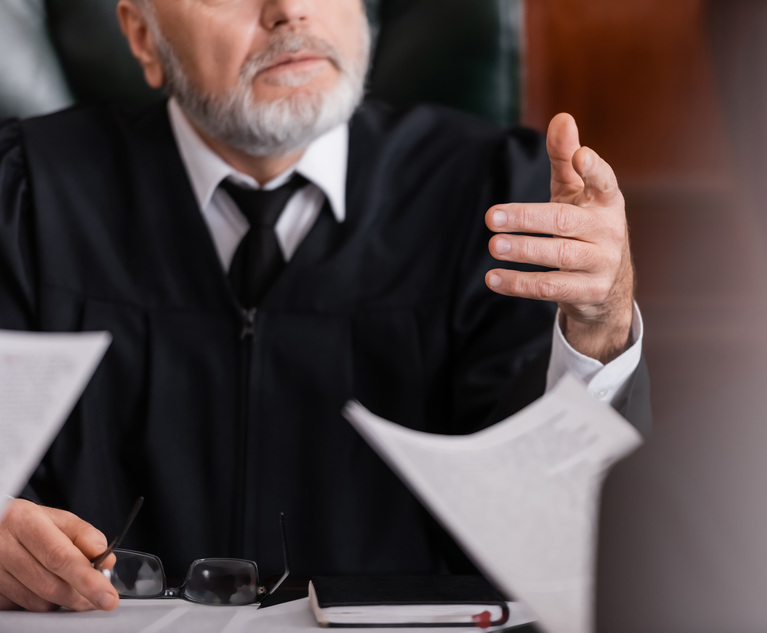Committee On Judicial Ethics

April 09, 2024 | New York Law Journal
Judicial Ethics Opinion 23-97Must a part-time town justice, who is also a full-time law clerk to a county court judge in the same county, be insulated in county court from all cases that he/she arraigned in the centralized arraignment part?
By Committee on Judicial Ethics
2 minute read

April 08, 2024 | New York Law Journal
Judicial Ethics Opinion 23-96A judge must insulate their law clerk from all matters in which the law clerk had any personal involvement as an attorney, but need not disqualify, provided the judge believes the judge can be fair and impartial.
By Committee on Judicial Ethics
4 minute read

April 07, 2024 | New York Law Journal
Judicial Ethics Opinion 23-95A judge (1) is disqualified, subject to remittal, in all cases in which a party is represented by an attorney from the small law firm that represents the judge's family's real estate business and (2) may not appoint an attorney from that firm as a guardian ad litem.
By Committee on Judicial Ethics
4 minute read

April 04, 2024 | New York Law Journal
Judicial Ethics Opinion 23-94Whether a judge may ask a defendant questions about court-ordered treatment when the defendant appears before the judge for a status review is a legal issue beyond our jurisdiction. It is, however, ethically permissible for the judge to ask legally permissible questions.
By Committee on Judicial Ethics
2 minute read

April 03, 2024 | New York Law Journal
Judicial Ethics Opinion 23-93A full-time judge may serve as a non-legal advisor on a stakeholders committee to advise the county on an assigned counsel program that will provide legal assistance to eligible litigants, where the program will not appear in litigation but instead will contract with private attorneys to undertake representation.
By Committee on Judicial Ethics
4 minute read

March 28, 2024 | New York Law Journal
Judicial Ethics Opinion 23-92A city court judge whose caseload may include criminal matters may attend meetings of local not-for-profit neighborhood/community groups as a guest speaker. At such meetings, the judge (1) should not speak about the root causes of violence and potential solutions through the lens of the judge's past and current professional experiences but (2) may otherwise discuss a variety of legal topics, including court procedures, the judge's professional career and judicial role, and governing law, subject to generally applicable limitations on judicial speech and conduct.
By Committee on Judicial Ethics
7 minute read

March 27, 2024 | New York Law Journal
Judicial Ethics Opinion 23-91A full-time judge may (1) serve as treasurer of their local American Legion post and (2) participate in a regional American Legion service committee which strives to help women veterans, subject to generally applicable limitations on judicial speech and conduct.
By Committee on Judicial Ethics
8 minute read

March 26, 2024 | New York Law Journal
Judicial Ethics Opinion 23-90Must a part-time attorney judge disqualify in matters involving a prosecutor whose spouse is a partner in the judge's own law firm?
By Committee on Judicial Ethics
2 minute read

March 25, 2024 | New York Law Journal
Judicial Ethics Opinion 23-89A judge is not disqualified from presiding in a wrongful death and civil rights action arising out of an incident in a county facility, merely because the underlying events occurred while the judge was a county legislator who voted on the county budget. Under the circumstances, disclosure is entirely discretionary.
By Committee on Judicial Ethics
5 minute read

March 24, 2024 | New York Law Journal
Judicial Ethics Opinion 23-88(1) A full-time judge who is, along with their siblings, a beneficiary of their parent's estate may (a) assist the sibling who is serving as executor in selecting an attorney for the estate; (b) review documents relating to the estate and the probate proceedings; (c) discuss the estate and the proceedings with the other sibling beneficiaries; and (d) provide free legal advice to their siblings, including the executor, regarding the estate and the proceedings. However, the judge may not represent their siblings or the estate, nor participate in meetings with estate counsel.
By Committee on Judicial Ethics
5 minute read
More from ALM
- Scan In Progress: Litigators Leverage AI to Screen Prospective Jurors 1 minute read
- Legal Speak at General Counsel Conference East 2024: Match Group's Katie Dugan & Herrick's Carol Goodman 1 minute read
- Legal Speak at General Counsel Conference East 2024: Eric Wall, Executive VP, Syllo 1 minute read



